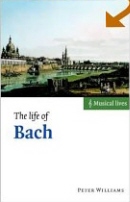|
Bach Books
Life of Bach
by Peter Williams
|
B-1 |
J.S. Bach: A Life in Music |
|
|
- |
|
Author: Peter Williams |
|
Language: English; ISBN: 0521870747 |
|
Cambridge University Press |
2007 |
HC / 380 pp |
|
Buy this book at: Amazon.com |
|
B-2 |
The Life of Bach (Musical Lives) |

|
|
- |
|
Author: Peter Williams |
|
Language: English; ISBN: 0521533740 |
|
Cambridge University Press |
2003 |
PB / 228 pp |
|
Buy this book at: Amazon.com |
|
A new Life of Bach |
|
Uri Golomb wrote (December 3, 2003):
As a subscrier to one of Cambridge University Press's newsletters, I was just notified that a new book on Bach is being published soon. Here is the description, copied and pasted from their newsletter:
***********************
The Life of Bach (Paperback)
Peter Williams
Series: Musical Lives
A searching and challenging interpretation of one of the greatest composers of all time. http://titles.cambridge.org/catalogue.asp?isbn=0521533740
***********************
You can find the table of contents and a sample chapter if you follow the link above. Also, they are publishing a revised edition of Williams' The Organ Music of J. S. Bach; see: http://titles.cambridge.org/catalogue.asp?isbn=0521891159 (link includes
description and table of contents, but not a sample chapter).
This e-mail is information only -- I have not read either book (though I've read several articles by Williams), so I cannot offer an opinion... I am sure, however, that several members are familiar with the earlier edition of The Organ Music. |
|
Bradley Lehman wrote (December 3, 2003):
[To Uri Golomb] Thanks for the info, Uri!
In that sample chapter, about Bach's early years with his brother, Williams brings up the BWV 993:
"At what point the young Bach dedicated his Capriccio in E major BWV 993 to his brother is not known, though its turgid formlessness and harmonic poverty are early signs. This piece suggests at least two things, one musical, one personal: that already the young composer was interested in creating length, in sustaining a movement without the aid of a text or programme; and that despite the moonlight episode there was a positive contact between the brothers."
Curious about that, and about the extremity of E major in it, I played through that BWV 993 Capriccio using the temperament that I described here on Sunday:
http://groups.yahoo.com/group/BachRecordings/message/11818
(which I've also been using to play the Inventions, and to play through Fischer's "Ariadne musica" to see how well it works, which is indeed well).
"Turgid formlessness": oh yes, very much. What a rambling structure.
But "harmonic poverty"? Not so bad, when played in a spicy temperament like this one. It's actually rather interesting where Bach wanders into the extreme sharps and double-sharps...and, for what it's worth, it works vividly in this temperament (in sound, the quality of the intervals, it works a lot better than it looks on paper with all the enharmonic notes that really don't exist in the temperament)!
The piece indeed sounds vacuous and harmonically impoverished when played in equal temperament: Sviatoslav Richter's recording on piano, Stradivarius 33323. Seven minutes of aimless counterpoint, and a performance so metrically steady it could pass for a computer-generated MIDI reading. Bleah. Now, I like Sviatoslav Richter's pianism very much when he's playing music other than Bach's and Handel's...and especially in Schumann and Mussorgsky and Debussy.
But his Bach is so plain and unremarkable, steamrolling the music's imaginative and dramatic features down to a clean and steady trudge.
Bach's music itself (well, at least the structure of it, if not the expressive intensity) comes across surprisingly clearly that way, anyway, despite such indifferent performances that bring out nothing, merely going through the notes accurately. But, I feel, that is not sufficient reason to uphold such an indifferent and anti-dramatic performance as a "great" standard. All it's shown is that Bach's music (even a mediocre piece such as 993) is more durable and indestructible than some, able to stand up to a null interpretation. It is a fallacy to assume, as the next step, that a null interpretation (hit all the notes and rhythms cleanly, period, as seen on a page) is necessarily the best one, that such durability is the main point of the music!
Would a preacher give a dull and pedantic sermon on purpose, to test the faith and attentiveness of the congregants, such that only the most virtuous will stick with all of it and be spiritually rewarded? Or an academic lecturer? That seems a very odd theological or didactic method, to me (where the students who put up with an inscrutable and pointless lecture, without complaining, are the only people who deserve a high mark).
I really don't understand the people who would assert that the "best" or "most authentic" (or whatever) performances of Bach are the ones that are unremarkable, un-enterprising, featureless (and dare I say: typically 1930s-60s Germanic). I thought about that some last week when reading a published review comparing Brookshire's and Cates' recordings of French Suites with Hogwood's, where the writer praised Hogwood's "commendable (...) straightforward, unmannered performances." [Fanfare magazine, Nov/Dec 2003] I listened again to Hogwood's rendition of the E-flat suite, #4, and couldn't help thinking (during the many mind-numbingly-dull passages of it): what's the great merit, really, in an unwillingness to take any interpretive chances, unwillingness to let the music become shapely? Is that deadly approach really an admirable self-denying humility before Great Music, or some attempt to recast Bach as a stern Puritan, or just a dearth of imagination (and a mistrust of imagination!)? That anything engaging is automatically Bad? |
| |
|